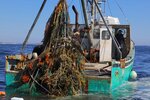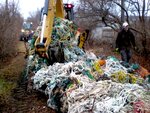

A small amendment to a sprawling, $2.86 billion economic development package set to pass in the next several weeks by the Massachusetts Legislature promises big hope in addressing a big environmental problem in the oceans off Cape Ann: ghost gear.
It’s a problem that’s largely out of sight, on the ocean’s floor. Yet abandoned fishing gear is a massive challenge that balloons more each year because of the woefully outdated, decades-old laws that govern the collection of this plastic, rope, polystyrene and steel debris.
Today, plastics in the ocean is a serious global environmental problem. According to the National Oceanic and Atmospheric Administration (NOAA)’s National Centers for Environmental Information, 19 to 23 million metric tons, or 11%, of plastic waste generated globally since 2016 entered aquatic ecosystems.
Livelihood and The Environment
If passed, the new legislation would be a pivotal step to tackle the critical challenge of gear debris polluting local waters, according to Robert Glenn, deputy director of the Massachusetts Division of Marine Fisheries (DMF).
In an interview, Glenn said the seed of today’s abandoned fishing gear issue goes back to the 1940s, when commercial fishermen intent on protecting their livelihood sought legal protection for their fishing equipment—mostly manmade wooden lobster traps—that were vulnerable to theft by competitors, activists, or curiosity seekers. They wanted legal protections, and they got them.
Ever since, any disturbance or removal of abandoned fishing gear is illegal, and may only be done by federal and state environmental police. Harbormasters may not touch fishing equipment. And members of the general public that do so risk prosecution.
The laws have remained firm, even as gear migrated from wood construction to polymer-coated steel cages and nylon ropes. But, said Glenn, this month’s passage of the new law, “An Act Relative to Abandoned Fishing Gear” would give the DMF the long-needed authority to deal effectively with a big problem.
“Up to this point we’ve been hand cuffed because of property owner rights and municipalities have been hamstrung from dealing with the issue,” he said.
The DMF began studying the impacts of derelict fishing gear in the early 2000s, and in a seminal 2010 study the organization found that derelict fishing gear, also known as “ghost gear” (abandoned, lost, or discarded fishing equipment), poses significant threats to marine ecosystems and fishing economies.
The issue is two-fold. First, the debris pollutes the ocean with microplastics and choke ocean life. But they also continue their jobs in macabre fashion by continuing to capture finned fish, crabs and lobster for up to 10 years.
“It’s a big problem,” said Beth Casoni, executive director of the 1,800-member Massachusetts Lobstermen’s Association (MLA).
“The new law would modernize the language on abandoned fishing gear and it’s long overdue,” Casoni said in an interview. “It’s positive change. It gets rid of red tape and will give individuals the ability to remove abandoned fishing gear from the water during the closed season.”
Harbormaster Bion Pike came to Manchester nearly 20 years ago after serving in the same role up in his home state of Maine, where lobstering is a central economic driver. As far as Massachusetts commercial harbors go, Manchester falls in the middle—19th in size among 40 or so. But of its license holders, nearly all are for lobstering.
Pike said there’s no doubt gear debris is a serious environmental hazard. But lobstering, he said, is also serious business. As a result, the “who and how” of gear handling is critical, and he understands why lobstermen would need a seat at the legislative table.
Hauling or removing or touching someone else’s lobster traps is verboten, he said. “It’s like hunting in the off season, without a license, at night … with a flashlight,” Pike said.
By the Horns
The focus on modernizing laws around abandoned equipment kicked into high gear in 2020, when the DMF began monthly meetings with counterparts in commercial fishing associations, federal and environmental agency representatives, and environmental groups.
Then Senate Minority Leader Bruce Tarr stepped in (“really taking the issue by the horns,” said Glenn). Tarr successfully attached the law as an amendment attached to a sprawling $2.86 billion state economic development bond bill passed earlier this month in the Massachusetts Senate on July 11. On July 18, the bill was sent to the joint conference committee where House and Senate conferees will compromise on the bill’s final language. Tarr said he is hopeful this Abandoned Gear amendment will be included in the final version of the bill.
“Removing abandoned gear from the ocean is one of the most powerful tools we have to prevent ghost fishing, avoid entanglement, and protect the marine environment,” said Tarr. “We need to give the Division of Marine Fisheries that authority to use that tool.”
Other regions and states have launched their own initiatives to address derelict fishing gear.
Other states and coastal regions have launched their own initiatives to address derelict fishing gear.
Several states have gear marking programs to help track and recover lost gear and hold those who abandon equipment accountable. Also, some states have introduced financial incentive programs that reward gear retrieval. Maine, for instance, has a “Lobster Trap Cleanup Program” that provides funding and resources for the removal of lost and abandoned lobster traps. The state works closely with local fishermen and environmental groups to conduct cleanup operations.
Finally, there are state-funded educational campaigns about the environmental and economic impacts of ghost gear being conducted in fishing communities on the West Coast and New England.
If the law in Tarr’s amendment survives this last step in the legislative process, there will finally be an opportunity for municipalities, NGOs, and others looking to clean up beaches and the ocean to have a mechanism to make it happen.
After all, Casoni said, the removal of derelict gear here on Cape Ann will lead to healthier marine ecosystems, ensuring sustainable fish populations and, consequently, a more stable fishing industry.
“Now, more than ever we need to ensure that all the abandoned fishing gear is removed from the waters and ensure animals can swim and feed freely when they are here.”